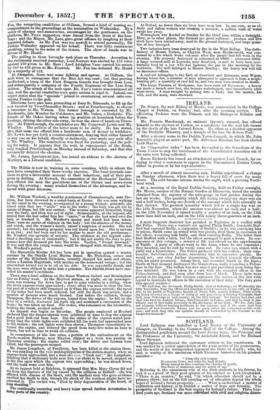IRELAND.
Dr. Singer, the new Bishop of Meath, was consecrated, in the College Chapel at Dublin, on Sunday last, after the morning service. Time- officiating Prelates were the Primate and the Bishops of Eillaloe and Tunas.
Mr. Francis Macdonogh, an eminent Queen's counsel, has offered himself to the electors of Carlow, as a candidate for the seat left vacant by the death of the late Celonel Bruen. He offers as a decided opponent of the Derbyite Ministry, and a disciple of the late Sir Robert Peel.
After a stormy scene in the Dublin Town-Council, in which Mr. John Reynolds played an active part, Mr. Alderman Kinalum has been elected Lord Mayor.
An "imperative order" has been forwarded to the Guardians of the Tuam Union to stop the instalment of the Consolidated Annuities out of the rates now being collected.
Baron Richards has issued an attachment against Lord French, for re- fusing to obey a summons to appear in the Encumbered Estates Court, either in person or by his representative.
After a month of almost unceasing rain, Dublin experienced a change on Sunday afternoon, when there was a heavy fall of snow for many hours. The cold became intense during the night, with a piercing North- west wind.
At a meeting of the Royal Dublin Society, held on Friday sennight, Mr. Moore, curator of the Botanic Garden at Glasnevin, stated the results obtained from the registry of the rain-gauge in that garden during the last six weeks. The quantity which fell during twenty-six days was six and a half inches, being one-fourth of the amount which falls annually in that district. The greatest :quantity which fell in a single day was on the llth November, when the amount was almost an inch and a half; on the 12th November it mined nearly a quarter of an inch, on the 13th more than half on-inch, and on the 14th nearly three-quarters of an inch.
A most desperate character has perished at Taghadoe in a conflict with the 'Police. There was a warrant out against Philip Smith; Constable Staf- ford had captured Reilly, a cordpankin of Smith's; as he was conveying him to prison, Smith came up armed with two pistols, fired them in succession at the officer, wounding him badly, and thus rescuing Reilly. The bitter then beat Stafford with a stick, but the officer managed to gain a house. In con- sequence of this outrage, a reward of 60/. was offered for the apprehension of Smith. A party of officers went to the house where he was concealed; they knocked, and he said he would come out. He came out, armed with a pistol and a. blunderbuss. The Police parleyed with the ruffian; their com- mander, Sub-Constable Adams, entreating him to surrender quietly. He would not ; and after further threatening, he walked towards the officers with his pistol presented. Adams fired, and wounded Smith in the knee; Smith at that moment discharged the blunderbuss, badly wounding a Police- man in the face. The ruffian was now seized and prevented from doing fur- ther mischief. He was taken in a cart with the wounded officer to the Police-barrack, and died soon after from loss of blood. These facts were proved at the inquest. The Corouer explained the nature of the law with regard to homicide by officers in the execution of their duty. The Jury gave this special verdict— "We find that the deceased, Philip Smith, died at Celbridge, on Wednesday the 24th Nevetnber, from the effects of a gunshot-wound received on the 24th, at Tagha- doe, in the parish of Taghadoe, barony of North Salt, county Kildare, when resist- ing being arrested on a charge of firing at and grievously wounding Constable Staf- ford, near Celbridge in said county, on the 18th instant. We further find that said shot was fired by Andrew Adams, Sub-Constable of Police, and that he fired it jus- tifiably and of inevitable necessity in the discharge of his duty. We the Jury can- not separate without bearing testunony to the humane and at the same time firm conduct of Sub-Constable Adams and the party under his command on this occa- sion; and wish that this our opinion should be forwarded by the Coroner to the Inspector-General."


































 Previous page
Previous page